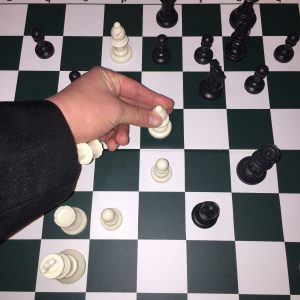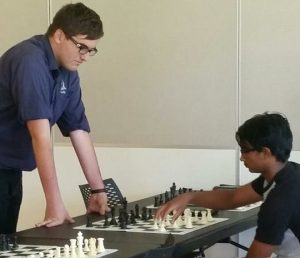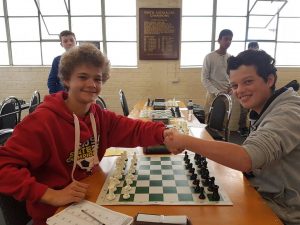Article by Chesslife Chess Coach Alex Jury
It’s June, 1978. The Philippines are about to bear witness to a clash of titans. Anatoly Karpov and Viktor Korchnoi, two of the greatest chess champions of all time are set to play for the title of Grandmaster. The stakes are high and the tensions higher. Both teams are on their guard. Korchnoi has brought his own personal chair. Karpov’s team request it be searched, lest Korchnoi try to smuggle in prohibited items. The chair is dismantled and x-rayed. Nothing is found, and the games can commence.

It’s the second match, 25th move. Karpov receives a blueberry yoghurt from his team. He did not request any. Korchnoi’s team protests. They say it could be a code; instructions encrypted by yoghurt colour. Karpov’s team could be instructing him to offer a draw or play more aggressively. It’s all a blueberry flavoured ruse, an underhanded trick to steal the title. The games are stopped and arbitrators brought in. Though Korchnoi’s team later suggest it was only a joke, someone took it seriously. For the remainder of the Championship, Karpov is only allowed a certain flavour of yoghurt, to be delivered at set intervals.
We may laugh at little stories like this (I know I did), however they underlie a more serious issue: Cheating. Advantage gained through dishonest means. It infects all forms of sport, and chess is no exception. Pieces are nudged to more favourable squares; advice is whispered, through phones and codes. Worse still, it taints even the very top of the chess player hierarchy. Gaioz Nigalidze, grandmaster title holder 2014 to 2015, used a smart phone, hidden in a bathroom, to elicit help from the outside world, during the 2015 Dubai open. Sergey Aslanov did something similar in the 2016 Moscow Open. The list goes on, though the story is the same; players resorting to underhanded methods get ahead.
If this is how adults play chess, how can we expect better from developing children? As a Chesslife Coach, I have personally seen (and reprimanded) kids for unsportsmanlike behaviour, some of which has strayed into the realms of cheating. So what is to be done?

The first thing we can do is ask a simple question: why? Why do kids do it? What compels a child to cross the moral boundary? Everything has a reason, and according Dr Elaine K. McEwan-Adkins, children cheat because:
- They feel pressured to win, especially in competitions.
- They feel unable to win otherwise.
- They feel an overriding impulse to win.
- They are influenced to cheat by the behaviour of others.
Now we know the main reasons, we need to know what to do when confronted by a child who cheats at chess. Father Val J. Peter believes in the following method:
Step 1 – Get the facts.
Ask the child about their cheating. Ask them what they did and, more importantly, why they did it. It is important to make sure this happens in a calm and controlled environment. Composure is key. Though the child has indeed done something wrong, they must be allowed to explain their actions.

Step 2 – Work with the facts.
Now that the child has given their reason for cheating, it’s time to take action.
Are the children feeling pressured by competitions? Remind them that winning isn’t everything. Celebrate their participation as well as their triumphs. Let them know that losing isn’t the end of the world. Assure them they have the right to lose, but not to cheat.
Do the children feel inadequate, unable to win by other, more honest, means? Just as before, assure them that winning is not the be all and end all. If they want to become better players, help them to do so. Let them join clubs, give them extra lessons and help them improve their game the proper way.
Do they form bad habits, or have an aggressive impulse to win? Teach them the value of honesty and hard work, earning your accomplishments and not taking moral shortcuts. The best lessons come from personal example. Become a positive role model. Children look up to their parents and will follow their example.

The most important thing to remember in all of this is that cheating, while bad, is not unforgivable. Like any other bad behaviour, it has both reason and remedy. While it is disappointing to discover that your child has engaged in cheating, it is more important to understand why, and help the kids improve their conduct. With some hard work and effort, your child will be spared from a life of cheating, lying and tampering with yoghurt.